Time for the UK Government to recognise the threat to our food security
Food supply chains across the world are set to feel the impacts of the war in Ukraine, with many consequences yet to filter through to the public consciousness. In a recent question to the Defra Minister, MP Daniel Zeichner asked what provisions the Government has in place to ensure the resilience of Britain’s food supply chain. The minister responded with what has become a stock reply that “food security is built on supply from diverse sources, strong domestic production, as well as imports through stable trade routes”.
Since that reply, feed and fertiliser supplies have been further impacted by the war in Ukraine, putting at risk our domestic production. Established trade routes are being severely tested or even closing down. The CEO of one of the Worlds largest fertiliser companies, Yarra voiced his deep concern to the BBC this week. He warned: “Half the world’s population gets food as a result of fertilisers… and if that’s removed from the field for some crops, [the yield] will drop by 50%. For me, it’s not whether we are moving into a global food crisis – it’s how large the crisis will be.”
So big is the threat to food security that Germany has convened a meeting of G7 Agriculture ministers to discuss how European countries can respond to these supply chain shocks
Here’s an alarming statistic: Russia produces two thirds of the world’s Ammonium Nitrate, which is the main fertiliser that farmers use for crops, grass and livestock farming, and which has soared in price from around £200 per tonne to £1000 per tonne over the last couple of years. In a move to shore up its domestic farming industry, Russia has already placed a ban on all exports of Ammonium Nitrate from 2 February.
If British farmers can’t source fertiliser, or if it is too expensive to buy, this will become a big problem very quickly and will drastically reduce the UK’s capacity to grow crops and rear animals. At a time when countries across the world are placing export bans on the food and feed they produce, alternative sources of food will become harder to find and more expensive.
So big is the threat to food security that Germany has convened a meeting of G7 Agriculture ministers to discuss how European countries can respond to these supply chain shocks. Here in the UK, it’s vital that Government recognises the enormity of the looming food crisis and moves to more of an emergency footing.
It should immediately facilitate an open forum where all participants in the food supply chain can come together regularly and share intelligence so we can all understand where the weaknesses in the food supply chain are likely to be. Such cooperation between industry and Government helps immensely in such a fast-moving situation.
Government also needs to step in to support our domestic food and farming industry to ensure it is not further weakened as a result of rising input costs and the ongoing labour crisis. One final thought: it should also support the development of the UK’s unique brand of regenerative agriculture which prioritises both environmental stewardship of the land alongside food production.






